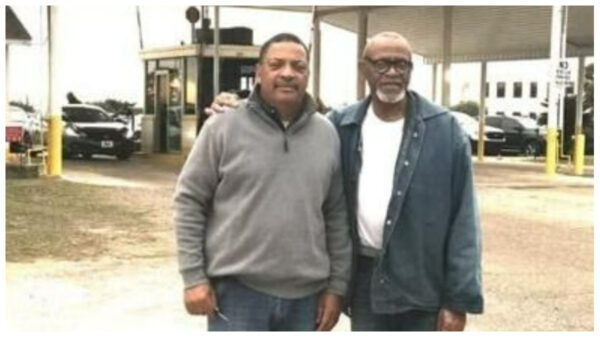The Louisiana Supreme Court ruled a lower court’s decision to sentence a Black man to life in prison without parole for stealing a book bag and a pair of sneakers was illegal. Now the district attorney’s office has reduced his charges, and, after over a decade, the senior citizen will be able to go home to see his loved ones.
On Tuesday, Nov. 22, East Baton Rouge state court Judge Tarvald Smith apologized to Joe “Willie” Washington on behalf of the state for how his case was handled by the system over the 11 years he has been incarcerated for the petty theft crime.

In an effort to rectify the grave injustice, he re-sentenced the 68-year-old to eight and a half years in Louisiana Department of Corrections custody with credit for the time he had already served, the Advocate reports.
“Mr. Washington, you have a story to tell,” the judge said. “The law can be unfair at times. But in the end, when I take this black robe off, I think justice has prevailed in this case.”
Washington had already served 11 years in the Louisiana State Penitentiary at Angola of his original life without parole sentence, more than the new sentence. As a result, he was eligible for immediate release. The judge said Washington should be set free “as expeditiously as possible.”
The remarks fell on Washington, his relatives, and friends in a mostly empty courtroom day before the Thanksgiving holiday, giving the family something very special to be thankful for — Washington’s freedom.
In addition to the early release, Assistant District Attorney Jermaine Guillory added he would have his office revoke the status of a habitual offender from his prison record.
In 2011, Washington, a former Scotlandville High School track star, was convicted of swiping a backpack and pair of tennis shoes out of the rear of a pickup truck outside of his alma mater’s football stadium in 2010.
The prosecution at the time pointed to his earlier convictions, some armed robbery and burglaries dating as far back as 1970.
East Baton Rouge District Attorney Hillar Moore submitted Washington was a fourth-felony habitual offender and used his prior convictions for armed robbery and two burglaries, to inform his current sentence.
Since each of those crimes was punishable by 12 years’ jail time, and he he one violent felony conviction and two felonies punishable by 12 years or more, he saw there were grounds to sentence him to life without parole under Louisiana’s habitual offender laws.
Moore believes judges should not be able to come in and change sentencing.
“The separation of powers doctrine is a fundamental constitutional principle that must be respected and followed,” Moore said. “We believe that (the post-conviction law) was not designed for DAs to become a pardon or parole board, nor do DA’s have the authority to commute sentences. Likewise, decision-making power in the justice system is separated for good reason.”
Habitual offender laws, which Moore relies on to support his point of view, are among some of the United States’ harshest sentencing enhancement laws and are designed to punish career criminals. Judge Smith stated their use in Washington’s case was not appropriate.
According to Smith, Washington’s simple burglary convictions cited by prosecutors may have carried a 12-year-maximum penalty in 2011, but that wasn’t the case in 1974 when the other offense actually occurred. Almost 50 years ago, the maximum sentence was just nine years.
Washington and his legal team, counsel provided by the Innocence Project in New Orleans, Chris Edmunds, argued that point since October 2020. Over the past two years they have been petitioning for sentencing relief for the man.
Edmunds said he took the case because it was “such an obvious error” that he originally thought it would be “resolved in a few months.”
However, going up against Moore, he said he felt like getting justice for his client was like “pulling teeth.”
Moore said he was just sticking to his belief that the original jury and judge’s decision should stand, and it is nothing personal toward Washington.
“While some may disagree with the decisions of juries and judges, absent abuses of discretion, respect for their decisions must be given,” he said. “To not do so would significantly demean the integrity of our system.”
Still, on Wednesday, Nov. 16, the Louisiana Supreme Court sided with Washington and his team, writing in its opinion, the “Applicant’s enhanced sentence of mandatory life imprisonment at hard labor without benefit of probation, parole, or suspension of sentence is illegal under the pertinent sentencing provisions.”
“Such [a] sentence should have been without benefit of probation or suspension of sentence, but there should have been no restriction of parole 11/16/22 eligibility because the penalty provision of the underlying offense contained none,” the opinion read. “Therefore, we vacate his enhanced sentence, and we remand to the district court for resentencing consistent with this ruling.”
After the ruling, Edmunds asked the court to give his client a “post-conviction plea deal” under the law of the state.
However, the high court said that would not be necessary, since both the mandatory life sentence and the mandate to not receive parole on Washington’s record were illegal. The appropriate option would be to resentence.
Experts believe this ruling will make it easier for prosecutors to go into other cases and cut down those sentences deemed unjust or overly punitive.
Supporters of Washington were ecstatic, with one, Linda Gibbens Robinson, promising to make him a pot of red beans and rice to celebrate his return home. Another friend, Wayne Robinson, spoke about how serendipitous the ruling was, saying, “It’s such perfect timing that he’s coming home just before Thanksgiving. We’re thankful to everybody. He’s getting his life back.”
Gratefully, Washington spoke directly to the judge with a promise to stay on the right path.
“I have my faults,” he said. “I made a mistake that will never happen again.”


